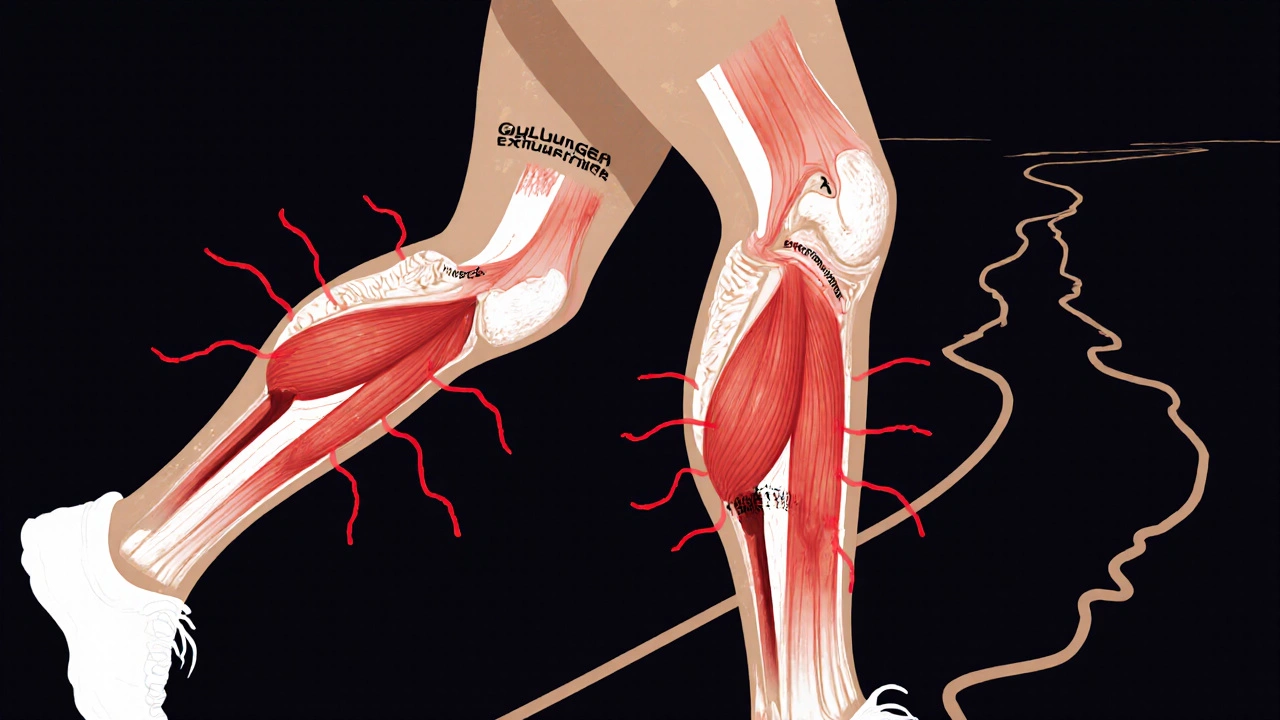Marathon Risk Calculator
Assess Your Risk
Answer these questions to see your potential injury risk when running a marathon without training.
Your Injury Risk Assessment
People ask this question every year: Can I run a marathon without training? The short answer? Technically, yes-you can show up, start running, and eventually cross the finish line. But that doesn’t mean you should. Running 42.195 kilometers without any preparation isn’t a feat of grit-it’s a one-way ticket to pain, injury, and possibly a hospital visit.
What Actually Happens When You Run a Marathon Untrained
Your body isn’t built for 26.2 miles. Not even close. Even if you’re in decent shape from daily walks or gym sessions, your muscles, joints, and cardiovascular system haven’t been conditioned for this kind of sustained stress. Without training, your legs will lock up around mile 18. Your knees will scream. Your hips will tighten. Your feet will feel like they’re filled with glass.A 2023 study tracking 1,200 first-time marathoners found that those who ran without a structured plan were 3.7 times more likely to suffer an injury requiring medical attention. The most common issues? Shin splints, plantar fasciitis, stress fractures, and severe muscle strains. One participant in that study ended up with a torn hamstring and spent six months in physical therapy.
It’s not just your legs. Your heart is working harder than it ever has. Your body burns through glycogen stores by mile 10. Without training, you won’t know how to pace yourself, how to hydrate properly, or when to stop. Many untrained runners collapse from dehydration, heat exhaustion, or low blood sugar. Emergency crews at marathons see a spike in ambulance calls from people who thought they could just "wing it."
Why Training Isn’t Just About Running
Training isn’t about logging miles. It’s about teaching your body to handle stress. Every long run teaches your muscles to use fat for fuel. Every tempo run improves your heart’s efficiency. Every rest day lets your tendons repair and strengthen.Untrained runners don’t know how to manage their effort. They start too fast, burn out early, and then try to power through the last 10K on pure willpower. That’s when injuries happen. Training teaches you pacing. It teaches you listening to your body. It teaches you that slowing down sometimes is the fastest way to finish.
And it’s not just running. Most training plans include strength work-squats, lunges, core routines-that protect your joints. Without them, your pelvis, knees, and ankles take the full force of every stride. A 2024 analysis from the Australian Institute of Sport showed that runners who did just two strength sessions per week reduced their injury risk by 52%.
The Myth of the "Natural Runner"
You’ve seen them-the person who’s never run more than 5K but says they’ll do a marathon because they’re "naturally athletic." Maybe they played soccer in high school. Maybe they’re a fast cyclist. Doesn’t matter. Endurance running is a unique demand.Running a marathon isn’t like sprinting or swimming. It’s a repetitive, high-impact, long-duration activity that taxes your body in ways no other sport does. Even elite athletes spend months building up to race day. Usain Bolt could run 100 meters in 9.58 seconds, but he couldn’t run 26.2 miles without training. Neither can you.
There’s no genetic shortcut. No hidden trick. No "just believe in yourself" magic. Your body needs time to adapt. Your connective tissues need to thicken. Your mitochondria need to multiply. Your lungs need to learn to pull oxygen more efficiently. That takes weeks. Not days. Not hours.

What If You’re Already Fit?
Maybe you run 10Ks every weekend. Maybe you lift weights, cycle, or hike on weekends. You feel strong. You think, "I can handle it."Still no. A 10K is less than a quarter of a marathon. The jump from 10K to 42K isn’t linear-it’s exponential. The physical toll increases dramatically after 20 miles. Your body starts breaking down muscle for energy. Your immune system weakens. Your risk of rhabdomyolysis-a condition where muscle cells break down and flood your bloodstream with toxins-rises sharply.
One runner I know in Melbourne, 38, ran a 10K personal best in September. He decided to sign up for the Melbourne Marathon in November. No training. Just "I’ve got this." He finished in 5 hours and 42 minutes. He couldn’t walk for three days. He needed IV fluids at the hospital. His creatine kinase levels (a marker of muscle damage) were six times above normal.
He’s not alone. Emergency rooms in cities with major marathons see a predictable spike in cases every October and November. People who thought they were prepared. People who didn’t realize how different a marathon is from any other distance.
The Real Cost of Skipping Training
The immediate cost? Pain, swelling, bruising, and maybe a trip to the ER. The long-term cost? A ruined relationship with running.Too many people try to run a marathon untrained, get hurt, and decide running isn’t for them. They quit. They never come back. That’s the tragedy. You don’t have to be fast. You don’t have to break records. You just have to be smart.
Training isn’t punishment. It’s preparation. It’s the difference between finishing with pride and finishing with regret. It’s the difference between saying, "I did it," and saying, "I survived it."

What Should You Do Instead?
If you want to run a marathon, here’s the truth: you need a plan. Not a fancy one. Not a 20-week program with heart rate zones and nutrition logs. Just a simple, consistent plan.- Start with a 5K you can run comfortably.
- Each week, add 10% to your longest run.
- Run three times a week. One long run. One easy run. One rest or cross-train day.
- After 12 weeks, you’ll be ready to run 20 miles.
- At 16 weeks, you’ll be ready for race day.
That’s it. No magic. No supplements. No expensive gear. Just time, consistency, and respect for your body.
If you’re short on time, even a 10-week plan is better than nothing. Do 3 runs a week. Walk the rest. Hydrate. Sleep. Eat real food. You’ll still finish. You’ll still feel amazing. And you won’t need a physical therapist afterward.
Final Reality Check
You can run a marathon without training. But you shouldn’t. Not because it’s impossible. Not because you’re not good enough. But because it’s unnecessary.Marathons aren’t about proving you’re tough. They’re about proving you’re smart. About respecting your body’s limits. About showing up not just on race day, but every single day for weeks before.
There’s no glory in limping across the finish line. No pride in being carried off by paramedics. No story worth telling about how you "pushed through" when you should’ve listened.
The real win? Crossing the line with your knees intact, your energy still there, and your love for running still alive.
Train. Not because you have to. But because you deserve to finish feeling like a champion-not a casualty.
